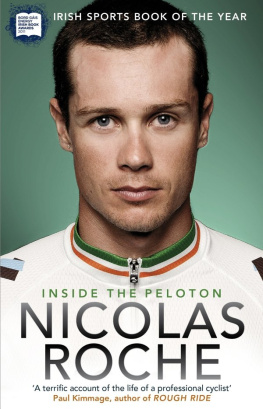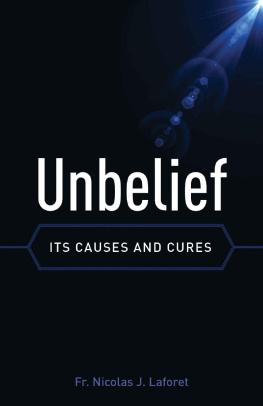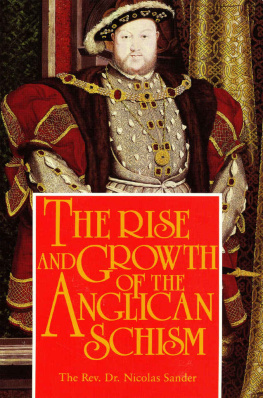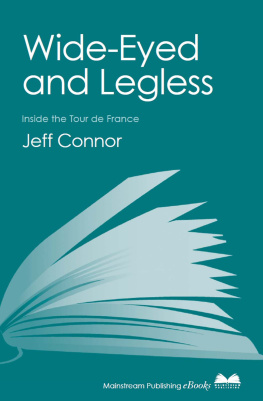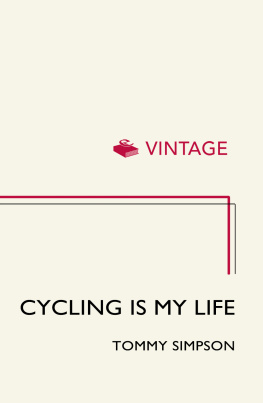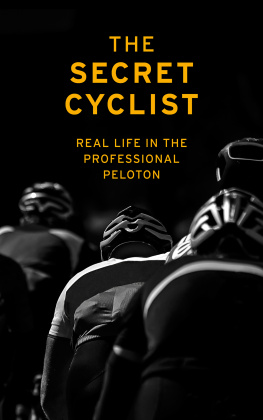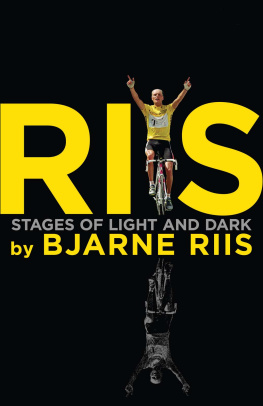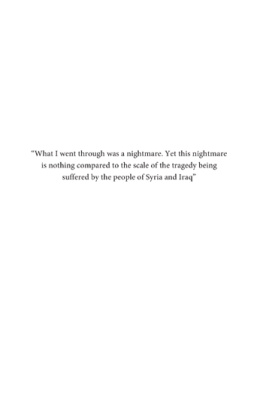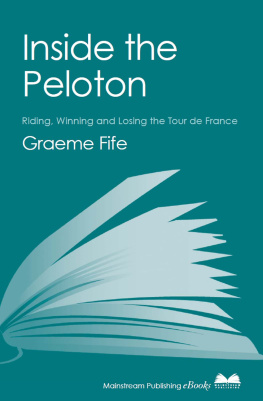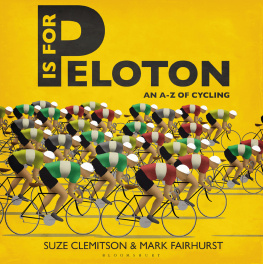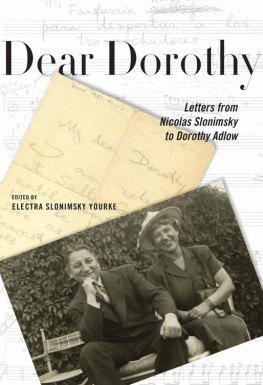About the Book
Professional cycling is a tough enough sport without the burden of a famous name. There are long, painful days in the saddle, one hotel room after another, the strictest of diets and the constant need to rest and recover. Yet from the moment he threw his leg across a bike as a 12-year-old, Nicolas Roche would have to emulate a legend. In 1987, his father, Stephen Roche, won the Giro dItalia, the Tour de France and the World Championship, all in the same season.
Based on his acclaimed diaries of life as a professional cyclist, Inside the Peloton is a unique, at times painfully honest account of what it takes to make the grade, and the incredible sacrifices and effort required to climb further up the ranks. From his early races in Ireland and France to becoming leader of the Ag2r La Mondiale team and competing at the highest level in the Grand Tours, Nicolas Roche tells a thrilling tale of life on the road.
CONTENTS
My Life as a Professional Cyclist
NICOLAS ROCHE
with
GERARD CROMWELL

Foreword
For five years I had been the only Irish professional cyclist in Europe, until a young Dubliner burst on to the scene with victory in ParisNice at his first attempt in 1981. Stephen Roche and I instantly became friends and while we never actually raced on the same team, apart from at the world championships each year, we never deliberately did anything to harm the others chances of winning a race. Between us, we won almost every major race on the professional calendar and, at one point, the only two Irish pros were ranked number one and two in the world.
My earliest memory of Nicolas Roche is of some time in 1984, when he was just a baby, and I was asked to act as Godfather at his christening in Dublin. I remember he was a pudgy little chap with jet-black hair. After that I would see Nicolas every so often when his mother Lydia brought him to watch Stephen race. I saw him a bit more when they moved to Dublin in the mid-1980s but lost contact for a while when the Roches moved back to France in 1999.
When Nicolas began racing in the South of France as a junior we got reports back in Ireland that he was riding well and putting in some good performances. When he came home to win the Junior Tour of Ireland in 2002, people here immediately began to compare him to his father. Off the bike, they heard the same accent, saw the same blue eyes and the same cherubic smile. On the bike, they saw a familiar sight too; his legs pumping piston-like underneath as his upper body remained motionless, as if he were part of the machine.
In their heads, Irish cycling fans rolled the clock back to 1987 and saw a future Tour de France winner, a potential world champion. But the son of a famous father gets that in every sport. Having gone through the system myself and watched numerous others follow behind me, I was aware that winning the Junior Tour or riding well as a seventeen-year-old could give others a little bit of a false impression of his chances for the future. As Stephen Roches son though, it was easy for people to pin their hopes on the teenager.
As Nicolas moved on to senior level, however, I soon realized that he really had potential. Slowly but surely he improved every year, winning good amateur races, moving to bigger teams, going on to the professional ranks, picking up wins here and there until he got to where he is now, not just riding but contesting the biggest races in the world.
With a former Tour winner for a father, it would have been easy for people to say that Nicolas was only on a certain team or riding a certain race because of his father. But I have seen first-hand that Nicolas has very much made his own way in the peloton. He got to where he is today under his own steam. Wary of drawing too much attention to his son by turning up at races or hovering in the background, even now, Stephen has pretty much stayed away from it all yet has always been there to offer advice when asked.
I know from speaking to others on the circuit that Nicolas is very well liked and respected by both his fellow riders and by the press and it was great to see him become the first rider ever to wear the Irish champions jersey in the Tour de France in 2009. To have the shamrock jersey at the front of the peloton and on the TV all day, every day, was a great boost to Irish cycling and brought the sport back into the public eye.
His Tour de France diaries in the Irish Independent are of major importance to the sport of cycling in Ireland. Throughout the three-week Tour, people from all walks of life follow Nicolas up and down mountains, in and out of hotels, on to the team bus and into the thick of the Tour every day.
His daily reports from inside the peloton have opened up the sport to a whole new generation and rekindled the interest of an older one, one that forgot about cycling when Stephen and I retired. They have tugged cycling back into the mainstream, into the news, television, radio and even on to the factory floor again. That is a great thing for cycling in Ireland.
In the last two or three years, Nicolas has been making great progress and from his performances in the 2010 Tour de France and Vuelta a Espaa, I think it is just a question of how far he can go.
In 2011, when he could possibly have broken into the top ten, if not the top five, in the Tour de France, he suffered big setbacks with early-season falls at Amstel Gold and Flche-Wallonne followed by a much worse crash in the final pre-Tour tune-up, the Critrium du Dauphin. Those crashes really knocked the carriage off the rails and he paid dearly for them at the 2011 Tour. But Nicolas is determined and focussed and I know he will be back.
I will be watching him closely, not just as a former professional rider or as a friend of the family but as a fan. He knows himself that he has room to improve and is keen to keep working hard to try to get into the top ten of the Tour de France.
If he can get into the top five at the Tour, the potential is there to aim even higher in years to come. He can start thinking about a podium place and at this point that is a distinct possibility. I think he has the ability to be a very strong one-day classic rider but at the moment he is focussed on preparing for the Tour de France. We havent seen the best of him yet. There is still a lot of potential left in Nicolas Roche.
Sean Kelly
Prologue
For a Yellow Jersey
The Tour de France is the worlds biggest bike race. Watched by a daily global audience of up to 900 million people as it winds its way up and over the Pyrenean and Alpine mountain ranges, through the towns and villages of France, its leader is easily distinguished by a yellow jersey.
To wear this maillot jaune, even for one day, is the pinnacle of many a riders career. But there is only one day that really counts. The final stage always ends on the Champs-Elyses in Paris. If you still have the yellow jersey at the end of that stage, after 3,500km of racing, then youve just won the Tour de France.
The final stage ended only minutes ago and I have the coveted yellow jersey in my clutches. The Champs-Elyses is packed with cycling fans, race staff and journalists. I have never seen so many people anywhere before in my life. As Im carried through the crowd in celebration, instinctively, I keep one hand on the yellow jersey.
I can see my mother standing just a few yards away. I stretch out my arms, but I cant get through the throng of television cameras, photographers and microphones to reach her. She starts to cry, tears of pride.

